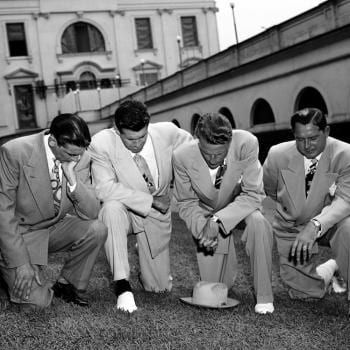Over the weekend one of the prominent New York neo-conservative intellectuals, the sociologist, Nathan Glazer died. He was 95.
He was a mensch.
He is also one of the most likable subjects in the fascinating documentary about the neo-cons, Arguing the World, a film that features Glazer, Irving Kristol, Daniel Howe, and Daniel Bell.
One of his famous essays, “The Limits of Social Policy,” came out almost 50 years ago. It still captures some of the basic dynamics of our contemporary political antogonisms:
In the liberal view, then, we have a sea of misery, scarcely diminished at all by voluntary charitable efforts. Government then starts moving in, setting up dikes, pushing back the sea and reclaiming the land, so to speak. In this view, while new issues may be presented for public policy, they are never really new—rather, they are only newly recognized as issues demanding public intervention. Thus the liberal point of view is paradoxically calculated to make us feel both guiltier and more arrogant. We feel guilty for not having recognized and acted on injustices and deprivations earlier, but we also feel complacently superior in comparison to our forebears, who did not recognize or act on them at all….
There is another element in the liberal view. It sees vested interests as the chief obstacle to the institution of new social policies. One such interest consists simply of those who are better off—those not in need of the social policy in question, who resist it because of the increase in taxes. But other kinds of obstructive interests are also there: real-estate people and landlords in the field of housing, employers subject to payroll taxes in the field of social security, doctors in the field of medical care, and so on.
Despite the assumption here of a conflict pitting liberals against conservatives, I would suggest that the main premises behind this general picture of social policy are today hardly less firmly held by conservatives than they are by liberals. In the American context, conservatives will differ from liberals because they want to move more slowly, give more consideration to established interests, keep taxes from going up too high. They will on occasion express a stronger concern for traditional values—work, the family, sexual restraint. But on the whole the line dividing liberals from conservatives grows steadily fainter. The Family Assistance Program, the major new reform of the welfare system proposed by the Nixon administration, will illustrate my point. Anyone who reads through the Congressional hearings on this proposal will be hard put to distinguish liberals from conservatives in terms of any naive division between those who favor the expansion of social policy and those who oppose it.
That convergence of conservatives and liberals — even Ronald Reagan would not roll back the New Deal — may explain the rise of Trump especially after the major parties became comfortable with Wall Street and the growing gap between elite wealth and populist impoverishment.
But where Glazer’s essay was particularly telling was in its description of the radical position:
The radical perspective on social policy comes in many variants, but they can all be summed up quite simply. If the liberal, and increasingly the conservative, believes that for every problem there must be a specific solution, the radical believes that there can be no particular solutions to particular problems but only a general solution, which is a transformation in the nature of society itself.
This point of view has consequences, just as the liberal point of view does. If, for example, the conservative proposes a guaranteed annual income of $1,600 for a family of four, and the liberal proposes that the figure be doubled or tripled, the radical will feel quite free to demand an even higher minimum. He knows that his figure is unlikely to be adopted, but he also knows that he can cite this failure as proof of his contention that the system cannot accommodate decent social demands. If, on the other hand, his policy or something like it is taken seriously, he can hope for a greater degree of class conflict as demands that are very difficult to implement are publicized and considered. And even if his policy is implemented, the radical remains firm in his faith that nothing has changed: the new policy is after all only a palliative; it does not get to the heart of the matter; or if it does get to the heart of the matter, it gets there only to prevent the people from getting to the heart of the largest matters of all. Indeed, one of the important tenets of radicalism is that nothing ever changes short of the final apocalyptic revolutionary moment when everything changes.
Indeed, many of the loudest critics, today’s social justice warriors, gain a lot of traction by saying that nothing has changed because the system has injustice so firmly baked in. Why it goes all the way back to colonial North American and the U.S. founding.
The one feature of our time that Glazer failed to grasp was social media. Now the radical can shout and show videos of all the injustices without having to convince an editor to publish or a producer to film or record.
Glazer was a smart guy who still deserves to be read.












